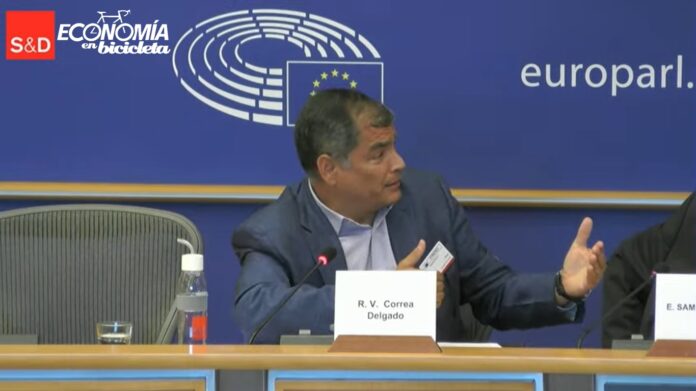Ecuador entered the world stage gallantly when it offered Julian Assange asylum for seven years at its embassy in London. But as right-centrist Daniel Noboa, 35, sat at the presidency on November 23, the country is all but forgotten.
In an apparent attempt to re-enter the world stage on a different topic, Noboa sent his vice president Veronica Abad to Tel Aviv as a “collaborator of peace between Israel and Palestine.”
Noboa has made no references to Assange, however, whose asylum was revoked in 2019 by President Lenin Moreno (2017 – 2021). Since then, Assange has sat in British prisons for almost five years, waiting to be extradited to the United States for complicity in obtaining and disclosing classified documents related to the national defense.
Former leftist president Rafael Correa (2007 – 2017) said in an interview that he feared Assange’s asylum would be revoked in an interview with El Dia while he was running for re-election in 2018. “I greatly fear for Julian Assange’s safety. I believe that it is a matter of time before this government that has betrayed all ideals… [and] removes its support.
According to the Guardian, “Ecuador bankrolled a multimillion-dollar spy operation to protect and support Julian Assange in its central London embassy, employing an international security company and undercover agents to monitor his visitors, embassy staff and even the British police, according to documents seen by the Guardian.”
Correa went further to develop an escape plan for Assange in the event of British authorities invading the premises of the Ecuador embassy to arrest him. “They included smuggling Assange out in a diplomatic vehicle or appointing him as Ecuador’s United Nations representative so he could have diplomatic immunity in order to attend UN meetings, according to documents seen by the Guardian dated August 2012.”
“In addition to giving Assange asylum, Correa’s government was apparently prepared to spend money on improving his image. A lawyer was asked to devise a ‘media strategy’ to mark the ‘second anniversary of his diplomatic asylum,’ in a leaked 2014 email exchange seen by the Guardian.”
An advocate of Assange was detained for questioning last month apparently in relation to his support of the activist. Former British diplomat Craig Murray was interrogated at Glasgow Airport upon his return from Iceland regarding his political beliefs. His laptop and phone were also taken.
According to Gray Zone, Murray had attended a popular Palestine solidarity event, and also met with high-ranking representatives of the Assange Campaign, which raises awareness about the plight of the WikiLeaks.
Assange is also supported by his father, who recently denounced Israel’s bombing of Gaza has only incited more anger and a “hunger for justice” across the world, in Sydney on November 20.
On November 8, United States politicians called for the charges against Assange to be dropped. Right and left parties joined together, submitting a letter in support of freedom of speech requesting U.S. President Joe Biden not to extradite Assange and to halt proceedings against him.
The letter claims, “It is the duty of journalists to seek out sources, including documentary evidence, in order to report to the public on the activities of government.”
It also states, “We believe the Department of Justice acted correctly in 2013, during your vice-presidency, when it declined to pursue charges against Mr. Assange for publishing the classified documents because it recognized that the prosecution would set a dangerous precedent.”
IP Correspondent






